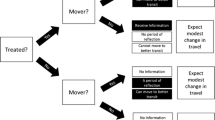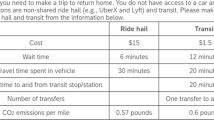Abstract
This paper presents a trial aimed at reducing parking demand at a large urban employer through an informational campaign and monetary incentives. A 6-week randomized controlled trial was conducted with (N = 2000) employee commuters at the Massachusetts Institute of Technology, all of whom frequently drove to campus. Split into four arms of five hundred each, one group received weekly informational emails highlighting MIT’s various new transportation benefits; a second group received monetary rewards for reducing their frequency of parking; a third group received both interventions, while a control group was monitored with no intervention. The paper aims to examine how behavioral incentives, namely targeted information provision and monetary rewards, can be used independently or in combination to encourage alternatives to drive-alone commuting. Success was measured as the extent to which drivers decreased their frequency of parking and increased their use of alternative modes during and after the campaign. While the combined treatment group contained the highest number of top-performing participants, no statistically significant differences-in-differences were observed amongst the treatment arms compared to the control. A post-experiment survey indicated a widespread increase in awareness of employer transportation benefits, and a much larger stated shift from driving towards transit than was supported by passively-collected data. Survey results suggested that while intent to reduce car use existed, complaints of insufficient quality of transit service and relative convenience of driving suppressed modal shifts. Most importantly, the discrepancy between self-reported and actual behavior change highlights important limitations and biases of survey-based travel behavior research.






Similar content being viewed by others
References
Ajzen, I.: The theory of planned behavior. Organ. Behav. Hum. Decis. Process. 50, 179–211 (1991)
Anable, J.: Complacent car addicts or aspiring environmentalists? Identifying travel behaviour segments using attitude theory. Transp. Policy 12, 65–78 (2005)
Ariely, D.: Predictably Irrational: the Hidden Forces that Shape our Decisions, First Harper Perennial edn, p. 2010. Harper Perennial, New York (2010)
Arnott, B., Rehackova, L., Errington, L., Sniehotta, F.F., Roberts, J., Araujo-Soares, V.: Efficacy of behavioural interventions for transport behaviour change: systematic review, meta-analysis and intervention coding. Int. J. Behav. Nutr. Phys. Act. 11, 133 (2014). https://doi.org/10.1186/s12966-014-0133-9
Bamberg, S.: Is a residential relocation a good opportunity to change people’s travel behavior? Results from a theory-driven intervention study. Environ. Behav. 38, 820–840 (2006). https://doi.org/10.1177/0013916505285091
Bamberg, S., Rees, J.: The impact of voluntary travel behavior change measures: a meta-analytical comparison of quasi-experimental and experimental evidence. Transp. Res. Part A 100, 16–26 (2017). https://doi.org/10.1016/j.tra.2017.04.004
Cherry, C., Riggs, W., Appleyard, B., Dhakal, N., Frost, A., Jeffers, S.: New and unique aspects of university campus transportation data to improve planning methods. In: Transportation Research Board 97th Annual Meeting. Washington, DC, (2018)
Dill, J., Wardell, E.: Factors affecting worksite mode choice: findings from Portland, Oregon. Transp. Res. Record: J. Transp. Res. Board 1994, 51–57 (2007). https://doi.org/10.3141/1994-07
Donohue Institute (2018). Greater Boston workforce planning blueprint. Technical report University of Massachusetts. URL https://www.mass.gov/files/documents/2018/06/19/Greater Boston Workforce Planning Blueprint_Final - 053118_clean.pdf. Accessed 1 Oct 2018
Duflo, E., Glennerster, R., Kremer, M.: Chapter 61 using randomization in development economics research: a toolkit. Handb. Dev. Econ. 4, 3895–3962 (2007)
Eriksson, L., Garvill, J., Nordlund, A.M.: Interrupting habitual car use: the importance of car habit strength and moral motivation for personal car use reduction. Transp. Res. Part F Traffic Psychol. Behav. 11, 10–23 (2008)
Feygin, S., Pozdnoukhov, A.: Peer pressure enables actuation of mobility lifestyles. Working Paper, UC Berkeley, (2017). URL http://faculty.ce.berkeley.edu/pozdnukhov/papers/Social_Modality_Lifestyles.pdf. Accessed 1 Oct 2018
Fisher, R.: The Design of Experiments. Oliver and Boyd, Edinburgh (1937)
Fisher, R.J.: Social desirability bias and the validity of indirect questioning. J. Consum. Res. 20, 303 (1993)
Fujii, S., Kitamura, R.: What does a one-month free bus ticket do to habitual drivers? An experimental analysis of habit and attitude change. Transportation 30, 81–95 (2003)
Gärling, T., Fujii, S., Boe, O.: Empirical tests of a model of determinants of script-based driving choice. Transp. Res. Part F Traffic Psychol. Behav. 4, 89–102 (2001)
Garvill, J., Marell, A., Nordlund, A.: Effects of increased awareness on choice of travel mode. Transportation 30, 63–79 (2003)
Gates, E.K.: New incentives to change modes: an experimental design to reduce single-occupant vehicle commuting in Kendall square. Master’s thesis, Massachusetts Institute of Technology (2015)
Goulden, M., Ryley, T., Dingwall, R.: Beyond ‘predict and provide’: UK transport, the growth paradigm and climate change. Trans. Policy 32, 139–147 (2014)
Graham-Rowe, E., Skippon, S., Gardner, B., Abraham, C.: Can we reduce car use and if so, how? A review of available evidence. Transp. Res. Part A Policy Pract. 45, 401–418 (2011). https://doi.org/10.1016/j.tra.2011.02.001
Hausman, J.A., Wise, D.: Technical problems in social experimentation: cost versus ease of analysis. In: Social Experimentation, pp. 187–220. University of Chicago Press, Chicago (1985)
Heider, F.: The Psychology of Interpersonal Relations. Wiley, New York (1958)
Hendricks, S.: Effectiveness of programs for work site trip reduction: the influence of organizational culture. Transp. Res. Record J. Transp. Res. Board 1924, 207–214 (2005)
Hoang-Tung, N., Kojima, A., Kubota, H.: Transformation from intentions to habits in travel behavior: an awareness of a mediated form of intention. Transp. Res. Part F Traffic Psychol. Behav. 49, 226–235 (2017). https://doi.org/10.1016/j.trf.2017.07.001
Hunter, R.F., Brennan, S.F., Tang, J., Smith, O.J., Murray, J., Tully, M.A., Patterson, C., Longo, A., Hutchinson, G., Prior, L., French, D.P., Adams, J., McIntosh, E., Kee, F.: Effectiveness and cost-effectiveness of a physical activity loyalty scheme for behaviour change maintenance: a cluster randomised controlled trial. BMC Public Health 16, 618 (2016). https://doi.org/10.1186/s12889-016-3244-1
ICF & CUTR. TCRP report 107: analyzing the effectiveness of commuter benefits programs. Transportation Research Board. (2005)
Jakobsson, C., Fujii, S., Gärling, T.: Effects of economic disincentives on private car use. Transportation 29, 349–370 (2002)
Kahneman, D., Tversky, A.: Prospect theory: an analysis of decision under risk. Econometrica 47, 263–291 (1979)
Kahneman, D., Tversky, A.: Advances in prospect theory: cumulative representation of uncertainty. J. Risk Uncertain. 5, 297–323 (1992)
Melia, S.: Randomised controlled trials, evidence hierarchies and smarter choices. World Transp. Policy Pract. 21, 64–71 (2015)
Metcalfe, R., Dolan, P.: Behavioural economics and its implications for transport. J. Transp. Geogr. 24, 503–511 (2012). https://doi.org/10.1016/j.jtrangeo.2012.01.019
Meyer, M.D.: Demand management as an element of transportation policy: using carrots and sticks to influence travel behavior. Transp. Res. Part A Policy Pract. 33, 575–599 (1999)
Ogilvie, D., Foster, C.E., Rothnie, H., Cavill, N., Hamilton, V., Fitzsimons, C.F., Mutrie, N.: Interventions to promote walking: systematic review. BMJ 334, 1204–1204 (2007). https://doi.org/10.1136/bmj.39198.722720.BE
Petrunoff, N., Rissel, C., Wen, L.M.: The effect of active travel interventions conducted in work settings on driving to work: a systematic review. J. Transp. Health 3, 61–76 (2016)
Rocheleau, M.: It’s not just you: Boston commute times among longest in the country. (2016). URL https://www.bostonglobe.com/metro/2016/09/15/boston-commute-times-are-and-rank-high-nationally/6IrmN54sCYdOKvffJjXcZI/story.html. Accessed 1 Oct 2018
Rose, G., Ampt, E.: Travel blending: an Australian travel awareness initiative. Transp. Res. Part D 6, 95–110 (2001)
Rosenfield, A., Attanucci, J., Zhao, J.: Evaluating commuter benefits at the Massachusetts Institute of Technology. In: Transportation Research Board 98th Annual Meeting, Washington, DC, (2019)
Shoup, D.C.: Evaluating the effects of cashing out employer-paid parking: eight case studies. Transp. Policy 4, 201–216 (1997)
Shoup, D.C.: The High Cost of Free Parking. Planners Press, American Planning Association, Chicago (2005)
Tertoolen, G., van Kreveld, D., Verstraten, B.: Psychological resistance against attempts to reduce private car use. Transp. Res. Part A Policy Pract. 32, 171–181 (1998)
UK Department for Transport: Making personal travel planning work: practitioners’ guide. Technical report. (2008). URL https://webarchive.nationalarchives.gov.uk/20101217070236/http://www.dft.gov.uk/pgr/sustainable/travelplans/ptp/practictionersguide.pdf. Accessed 1 Oct 2018
UK Department for Transport: An evaluation of low cost workplace-based interventions to encourage use of sustainable transport. Technical report. (2017). URL https://www.gov.uk/government/publications/evaluating-low-cost-interventions-to-encourage-the-use-of-sustainable-transport. Accessed 1 Oct 2018
UK Ministry of Housing, Communities & Local Government: Travel plans, transport assessments and statements. (2014)
U.S. Bureau of Labor Statistics: Employment projections program. Technical report. (2017). URL https://www.bls.gov/emp/tables/median-age-labor-force.htm. Accessed 1 Oct 2018
Wen, L.M., Kite, J., Rissel, C.: Is there a role for workplaces in reducing employees’ driving to work? Findings from a cross-sectional survey from inner-west Sydney, Australia. BMC Public Health 10, 50 (2010). https://doi.org/10.1186/1471-2458-10-50
Yang, L., Sahlqvist, S., McMinn, A., Griffin, S.J., Ogilvie, D.: Interventions to promote cycling: systematic review. BMJ 341, c5293–c5293 (2010). https://doi.org/10.1136/bmj.c5293
Acknowledgements
The authors gratefully acknowledge the support of the FHWA Value Pricing Pilot Program.
Author information
Authors and Affiliations
Corresponding author
Ethics declarations
Conflict of interest
On behalf of all authors, the corresponding author states that there is no conflict of interest.
Additional information
Publisher's Note
Springer Nature remains neutral with regard to jurisdictional claims in published maps and institutional affiliations.
Rights and permissions
About this article
Cite this article
Rosenfield, A., Attanucci, J.P. & Zhao, J. A randomized controlled trial in travel demand management. Transportation 47, 1907–1932 (2020). https://doi.org/10.1007/s11116-019-10023-9
Published:
Issue Date:
DOI: https://doi.org/10.1007/s11116-019-10023-9




